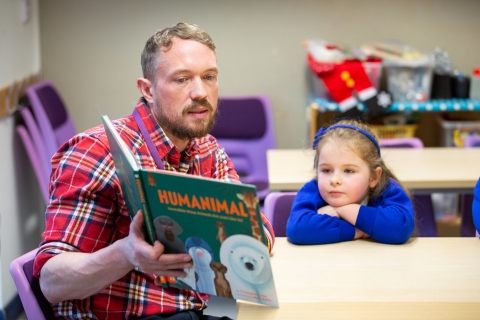

Become a Primary School teacher
What you need to get started
As a primary school teacher, you’ll teach children aged 4 to 11, covering Reception through to Year 6. You’ll usually teach all subjects in the national curriculum to one class for the academic year. Some teachers specialise in subjects like music, drama or PE and teach across year groups.
Primary teaching stages are divided according to the national curriculum:
-
Early Years Foundation Stage – Reception (age 4 to 5)
-
Key Stage 1 – Years 1 and 2 (ages 5 to 7)
-
Key Stage 2 – Years 3 to 6 (ages 7 to 11)
Your role is to help children build academic, social and emotional skills. You’ll plan lessons, manage classroom behaviour, assess progress and speak with parents.
Is teaching right for you?
Getting experience in schools helps you decide if teaching is right for you and strengthens your application.
You can choose to:
-
Volunteer at a local school
-
Complete an optional placement year
-
Use the Department for Education’s Get School Experience programme
-
Watch teaching videos from channels like Laser Learning, MediaMerge and Teachers TV to reflect on classroom practice
You can also arrange your own school experience by emailing schools directly. Use the Register of Schools to find schools and contact details.
Need help securing work experience?
Visit the Careers and Employability Service or chat to the team through our 1-1 appointments.
Qualifications you need to become a primary school teacher
To teach in a state school in England or Wales, you need Qualified Teacher Status (QTS). Most people get QTS through Initial Teacher Training (ITT), which includes a PGCE.
Entry requirements
-
A UK degree (or recognised equivalent)
-
GCSEs at grade 4/C or above in English, Maths and Science
-
To have declared any previous convictions and undergone the criminal records check through the Disclosure and Barring Service (DBS).
Requirements vary in Northern Ireland or Scotland. The UCAS website provides a breakdown of eligibility requirements for primary school teacher training in all parts of the UK.
Visit the Get into Teaching website for routes and eligibility if you want to teach in Scotland or Northern Ireland.

Where to find Initial Teacher Training (ITT) courses
To become a primary school teacher, you'll need to complete ITT to gain your Qualified Teacher Status (QTS). There are a number of routes you can choose, including:
University-led routes
This involves studying at a university while completing school placements. You’ll gain a Postgraduate Certificate in Education (PGCE) or Postgraduate Diploma in Education (PGDE), alongside your QTS.
School-led routes
These are practical, hands-on training programmes based in schools. With School Direct and SCITT (School-Centred Initial Teacher Training), you train in the classroom, often in partnership with universities.
Postgraduate Teaching Apprenticeship
This is a salaried route where you work in a school and train on the job, typically over one year. It combines practical experience with academic study, leading to QTS.
Fees and funding
How you fund your teacher training depends on the route you take, but there are practical options available to help you get started.
Help with tuition fees
If you're training through a university-led PGCE or School Direct (fee), you can apply for a tuition fee loan through Student Finance, just like for your undergraduate degree. This loan covers the full cost of your course, and you won’t have to pay anything upfront.
Extra financial support for your subject
If you're teaching a high-demand subject like maths, computing, chemistry, or physics, you could receive a tax-free bursary of up to £29,000, or apply for a scholarship worth even more, along with subject-specific mentoring, resources and networking.
You don’t need to pay back a bursary or scholarship – it’s yours to support your training journey.
Bursaries and scholarships for postgraduate teaching
Earn while you train
Prefer to earn a salary while you learn? Choose a salaried route, like Teach First, School Direct (salaried), or a Postgraduate Teaching Apprenticeship. You’ll be employed by a school, get paid, and gain hands-on experience in the classroom from day one.
How to apply
For University-led and School-Centred Initial Teacher Training, apply through the GOV.UK portal or UCAS.
For schemes such as Teach First, you should apply directly through them.
Your application will include a personal statement, and you’ll be invited to an interview. You may also take part in group tasks or other assessments.
To help with your application, you can:
-
Join a Get into Teaching event
-
Use the DfE’s Teacher Training Adviser service for one-to-one help
-
Book a mock interview with the Careers and Employability Service

Once you’re qualified
After your training, you’ll begin your first teaching role as part of the Early Career Teacher (ECT) programme, a two-year support package designed to help you make a strong start in the classroom. You’ll benefit from regular mentoring, reduced teaching hours, and structured professional development. It’s all about giving you time to build your confidence, grow your skills, and feel fully supported as you step into your new role.
Your school will assign a mentor who’ll guide you through your ECT years, helping you reflect on your practice, develop your teaching style, and meet the Teachers’ Standards.
When you’re ready to find your first teaching job, start with these helpful job boards:
These platforms offer practical job search advice, listings for teaching vacancies across the UK, and guidance on what to expect during your application process.
Explore more in the Teaching Career Guide
Early years teaching
Increase your chances of getting into your chosen career in teaching by following our guide to getting experience and finding a job.

Getting into secondary school teaching
Getting into further education teaching
Increase your chances of getting into your chosen career in teaching by following our guide to getting experience and finding a job.





